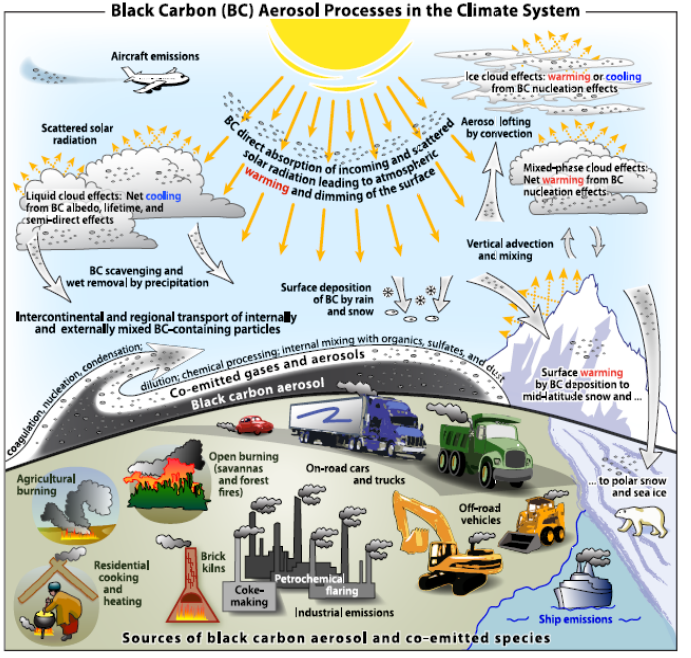If you worry about climate change and the environment, as we do, there have been two pieces of good news recently. One of them is the widely publicized super-smog in Chinese cities. The other one is less well known, but could be even more important: a study showing that black carbon (AKA soot) may be almost as important for climate change as CO2.
Foul air in Chinese cities is nothing new, we even used it in one of our “black swan” scenarios just recently. However, the most recent concentrations were off the charts: while the World Health Organization (WHO) draws the line at 25 microgram/m3 of particles, levels in Beijing almost reached 1,000 (!). See some stunning photos of the Beijing smog e.g. here. It is less and less possible for the authorities to downplay the scale of the problem, given the spread of information about the exact extent of the pollution and its health effects on the internet. Also, as Chinese citizens become richer, they have the motivation and the means to fight against pollution. We detailed this view here, saying that it is “Chinese public anger and protests” against local pollution that has a chance of seriously slowing, as a side effect, global CO2 emissions.
![Severe-smog-and-air-pollu-010[1].jpg](https://m.blog.hu/gu/gurulohordo/image/Severe-smog-and-air-pollu-010%5B1%5D.jpg) Source:The Guardian
Source:The Guardian
The current super-smog is a human tragedy. But if it can galvanize opinion (including the Party leadership) into doing something about pollution, then the long term effect may be beneficial. Half as high pollution levels as the current ones are nothing special in Chinese cities, and persist much longer. They probably claim a higher human cost, but that is not news any more. Just consider lung cancer mortality rates in China, which have risen fivefold over the past 30 years. That is why the pollution spike, while a tragedy in the short run, can save lives in the long run. In our wild end-year piece, we forecasted that China would decide to “eliminate coal use in power plants and replace it with gas in 10 years”. That still seems unlikely. But cleaner coal (with filters) is almost certain, and the idea of “peak coal” in China is gaining ground.
![U153P5029T2D549882F31DT20130117092432[1].jpg](https://m.blog.hu/gu/gurulohordo/image/U153P5029T2D549882F31DT20130117092432%5B1%5D.jpg) Source: China News
Source: China News
But eliminating smog does not necessarily mean eliminating CO2 emission, and this is where the second, less publicized piece of news comes in (here is an article on the issue in the latest Economist). Its main conclusion is that soot (which is also the main reason behind bad air quality in Chinese cities) currently may cause 2/3 as much global warming as CO2 does. In Arctic regions, where warming have been the most pronounced, it may cause more. This is good news because soot is a lot easier to eliminate than CO2. Soot is a sign that things are burning imperfectly. Usually it is a good idea to burn things as perfectly as you can even for economic/energy efficiency reasons. And filtering exhaust gases is relatively cheap, compared to say stopping using fossil fuels. Burning biofuel for cooking in developing countries is also a big source of black carbon, and that also should have already been made cleaner for local health reasons alone.
 Source:Green Car Congress
Source:Green Car Congress
So here you go: cutting soot emissions is cheap, good for local health and the environment and also reduces global warming. And China may be getting serious about it. The findings of this latest study should still be confirmed, but if they prove credible, environment effort in the next 10 years should be concentrated on reducing soot emissions. That will not solve the long-term CO2 problem, but will buy time for technology to come up with affordable solutions.
And of course the best way to cut soot (but also a sizeable part of the CO2) is our long time obsession of burning natural gas instead of coal or even oil. That emits only about one third of the CO2 emission of coal in power plants. And the simpler the hydrocarbon, the more perfectly it burns. Methane, the main component of natural gas, is the simplest hydrocarbon, and it burns without soot in power plants and engines. Go, methane economy, go!
A bejegyzés trackback címe:
Kommentek:
A hozzászólások a vonatkozó jogszabályok értelmében felhasználói tartalomnak minősülnek, értük a szolgáltatás technikai üzemeltetője semmilyen felelősséget nem vállal, azokat nem ellenőrzi. Kifogás esetén forduljon a blog szerkesztőjéhez. Részletek a Felhasználási feltételekben és az adatvédelmi tájékoztatóban.




